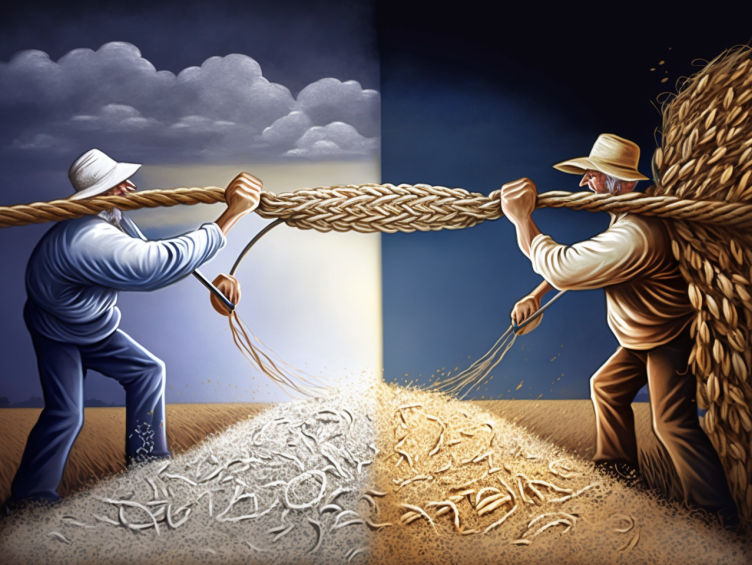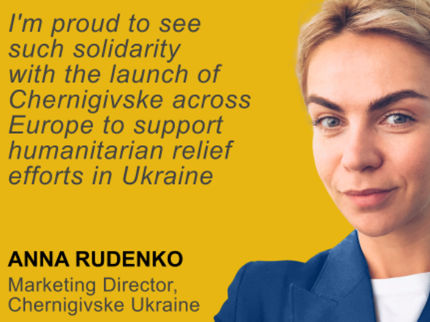Grain export ban looms: Tug of war between Moscow and Kiev
Famine threatened many countries when Russia blocked the neighboring country's Black Sea ports and thus grain exports after invading Ukraine in February 2022. A solution was found through mediation by the United Nations (UN) and Turkey. However, Russia is threatening to let the agreement expire at the end of next week. UN Secretary-General António Guterres is trying to mediate.
What is the UN- Black Sea Grains Initiative?
The blockade of Ukrainian exports and sanctions against Russia have led to sharp price increases for grains and fertilizers, among other commodities, over the past year. Russia and Ukraine supplied nearly a quarter of the world's grain exports before the war. In July 2022, the Black Sea Grain Initiative between the UN, Turkey, Ukraine and Russia came into being. It allows controlled grain exports from the Black Sea ports of Odessa, Chornomorsk, and Pivdenny (Yuzhny). The ships are inspected before they sail through the Bosporus into the Marmara Sea and then the Mediterranean Sea. Among other things, Russia wants to exclude arms deliveries to Ukraine in this way.
How long is it valid?
The agreement was initially valid for 120 days until November, and was then extended for another four months after tough negotiations. It expires on March 19, according to the UN.
Is it running smoothly?
It is running, but not smoothly. Arrangements among inspectors are laborious, and Russia has withdrawn forces, reducing the number of inspector teams, UN sources say. That's why ships are jammed at the Bosphorus. In early March, 33 ships were waiting for inspection, according to the center.
Which parts of the deal benefit Ukraine, which Russia?
For Ukraine, it is important that exports bring money into its coffers. It could empty grain elevators in 2022 thanks to the deal, preparing for a new harvest season. Russia needs UN aid to be able to export grain and fertilizer. Western sanctions restrict many Russian businesses. While grain and fertilizer are not directly affected, Russian players have a hard time calling at European ports, processing payments, and getting ship insurance. That's why a separate agreement between the UN and Russia is part of the deal. In it, the UN promises to do everything possible to remove the barriers that impede Russian grain and fertilizer exports.
How are exports controlled?
Ships land off Istanbul in a control zone where they are checked for unauthorized cargo. Subsequently, the control team passes on a permit to the center - or not. The ships are only allowed to carry grain, other foodstuffs or fertilizers approved by the center.
How many grain ships actually leave?
Since the initiative began, about 900 ships have transported goods out of Ukrainian ports. The daily number of ships can sometimes vary widely.
Is the full capacity being used?
By the beginning of March, a good 23 million tons of grain had been exported on this route. Currently, it is three to four million tons a month, but the potential would be seven million.
What are the Russian complaints?
Russia complains that Western sanctions continue to hamper its exports. Foreign Minister Sergei Lavrov told his Turkish counterpart Mevlüt Cavusoglu in early March that the initiative could only continue if the interests of Russian producers of agricultural products and fertilizers were better taken into account. Moscow wants to bring ammonia for the production of fertilizers onto the world market again. This used to be done mainly through a pipeline through Ukraine, which is now blocked. Russia also accuses Ukraine of ensuring that the grain hardly reaches poor countries, but is sold as animal feed to Western countries for a lot of money.
What is Kiev's position on this?
Opening the ammonia pipeline from Russia's Tolyatti to the southern Ukrainian port city of Odessa is politically explosive. Kiev has floated the release of Ukrainian prisoners of war as a quid pro quo. Prisoner exchanges now take place regularly, but there has been no news of progress on opening the pipeline. For its part, Kiev wants to ensure that other ports can be used, especially Mykolaiv. The goal is to export another 25 million tons of grain by July.
What does the United Nations think?
UN representatives admit that Russian exports are stuck. "It's no secret that there are a number of challenges of a regulatory and other nature that need to be overcome," UN spokesman Stephane Dujarric said. For months, more than 250,000 tons of Russian fertilizer exported before Russia's invasion of Ukraine were stuck in Latvia and other European transit ports because of Western sanctions. The UN facilitated the first shipment of Russian fertilizer from the Netherlands to Malawi in November, and similar shipments are planned to other African countries. Regarding the ammonia pipeline, UN officials hope Kiev will relent.
Do the exports actually reach countries threatened by hunger?
Among the recipient countries, the UN lists Afghanistan, Ethiopia, Iraq and Yemen. However, only small quantities of a few tens or hundreds of thousands of tons go there. The bulk has so far been delivered to China: 4.9 million tons, followed by Spain with 4 million tons and Turkey with 2.7 million tons. This says nothing about the final destinations of the deliveries. In Germany, a good 350,000 tons had arrived by the beginning of March./oe/DP/zb (dpa)

Computer generated picture
Note: This article has been translated using a computer system without human intervention. LUMITOS offers these automatic translations to present a wider range of current news. Since this article has been translated with automatic translation, it is possible that it contains errors in vocabulary, syntax or grammar. The original article in German can be found here.

























































